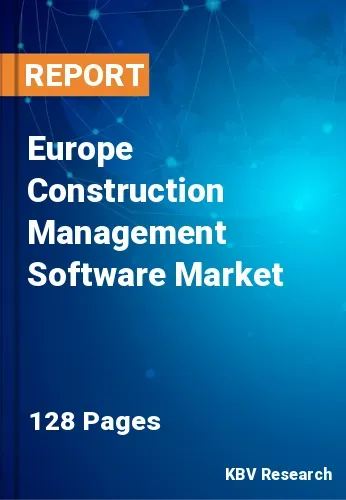The Europe Construction Management Software Market would witness market growth of 9.0% CAGR during the forecast period (2022-2028).
Successful construction or engineering delivery starts with a well and collaboratively built schedule. A schedule that coordinates the right resources on the right work at the right time, enhancing communication between field and office teams to increase productivity and live response to project changes. With construction management software for scheduling, planning, and resource management, project teams can integrate the contractual CPM activity schedule with the field task management details.
Visual execution and planning options join office and field teams into a single community, one project, and one program. Generally, these solutions can be utilized for any size project and are available from anywhere. Also, users can configure the solution to meet individual project requirements and centralize best practices for all projects. Complexity is increasing across all construction areas, aligning fields and offices, depending on external teams, making fast decisions, and interpreting vast amounts of data.
All need greater digitalization to perform optimally. The legacy system and spreadsheets utilized to manage projects will hinder the construction businesses from growing and adapting rapidly in the present market. With strong controls, organizations can automate, track and manage budgets, commitments, spends, forecasts, and business processes within and across the supply chain.
According to the report of the Germany Tarde and Investment (GTAI) organization report, the building industry housing construction volume in Germany has increased to EUR 264 billion in 2020, which was earlier at EUR 245 billion in the previous year, while the public and commercial sectors raised to EUR 65 billion and EUR 130 billion respectively in 2019. The German government and the rail form Deutsche Bahn have committed to invest EUR 86 billion in railways, switching stations, trains, and other infrastructure in the next decade. The increasing construction work, joined with the rising investment by the government to further develop the infrastructure, will propel the usage of the construction management software market in the region.
The Germany market dominated the Europe Construction Management Software Market by Country in 2021, and would continue to be a dominant market till 2028; thereby, achieving a market value of $1,032.1 million by 2028. The UK market is anticipated to grow at a CAGR of 8.1% during (2022 - 2028). Additionally, The France market would exhibit a CAGR of 9.9% during (2022 - 2028).
Based on Component, the market is segmented into Solution and Services. Based on End User, the market is segmented into Architects & Designers, Construction Managers and Others. Based on Deployment Mode, the market is segmented into On-premises and Cloud. Based on Building Type, the market is segmented into Residential Building and Commercial Building. Based on Application, the market is segmented into Project Management & Scheduling, Field Service Management, Safety & Reporting, Project Design, Cost Accounting and Others. Based on countries, the market is segmented into Germany, UK, France, Russia, Spain, Italy, and Rest of Europe.
Free Valuable Insights: The Global Construction Management Software Market will Hit $16.6 Billion by 2028, at a CAGR of 9.8%
The market research report covers the analysis of key stake holders of the market. Key companies profiled in the report include Oracle Corporation, SAP SE, Autodesk, Inc., Bentley Systems, Inc., Trimble, Inc., Constructconnect, Inc. (Roper Technologies, Inc.), Jonas Construction Software, Inc. (Constellation Software Inc.), Buildertrend, Computer Methods International Corp., and Odoo SA.
By Component
By End User
By Deployment Mode
By Building Type
By Application
By Country

Our team of dedicated experts can provide you with attractive expansion opportunities for your business.

